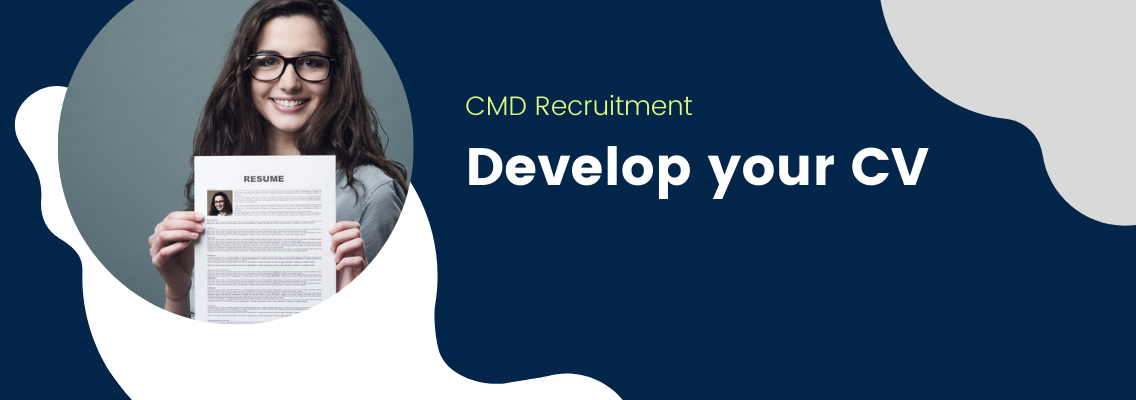Important notice - We are aware of a scam where people are impersonating CMD Recruitment to offer jobs via WhatsApp & Telegram. This is a scam, CMD Recruitment will never contact new candidates via these methods. Any legitmate offer from CMD Recruitment would be made via a telephone call.

November 25, 2021
Ready to start your career in human resources? Working in human resources – or HR as it is commonly called – is a challenging and varied environment. No two days are the same and you will often be challenged to learn new skills and competencies every day. If you’re interested in a role with incredible potential for professional growth and development, this could be ideal for you.
The HR department is responsible for taking care of a company’s employees. They are responsible for recruitment and selection, onboarding, employee development, retention, workplace culture and creating a positive work environment. They are also responsible for keeping the workplace safe and compliant with all working regulations.
A good HR professional can save a company money by helping them to keep hold of their best employees. They can also help to avoid nuisance lawsuits by handling grievance procedures and disciplinaries.
If you’re thinking about starting a career in HR, these are the steps you should take to put yourself on the path to success.
There are many routes into HR, but most people start with some kind of formal training. This could be a bachelor’s degree in human resources or a postgraduate certificate in human resources. Studying for a qualification will give you the skills, knowledge and structure to begin your career.
Gaining a degree in HR will show considerable commitment to working in the industry. Most degree programmes will last around three years, and you will learn a lot in that time. Many students are also encouraged to use summer holidays to gain work experience to help strengthen their CV after graduation. Once you receive your diploma, you’ll be ready to take on an HR officer or HR administrator role with ease.
You don’t have to study for an HR qualification. You could also study for a degree in psychology, sociology, finance, public administration or business management. Many of these courses will touch upon essential skills for a career in HR and give you plenty to talk about in an interview.
Another route into HR is through certification and work experience. If you have some work experience behind you, it might be possible to use skills developed in other industries and apply them to a career in HR. However, it’s worth noting that you will be up against individuals with HR degrees. If you want to strengthen your application, consider studying a short course in HR delivered by a recognised provider such as CIPD.
Even if you have the experience to back up your application, it can be helpful to get your CV past automated checks that are looking for individuals with an HR-specific qualification. You might already know the contents of the course, but taking the qualification provides added reassurance to potential employers.

There’s only so much you can learn in school. While an HR qualification will give you theoretical knowledge of how the sector works, only getting to grips with a role will help you to appreciate how the parts fit together. Getting work experience is essential for your understanding of the role, but it can also be great for building your contacts.
Work experience or internships with HR departments offer a window into the way the job works. It’s also great material for sharing during an interview. Having hands-on experience of a situation is far better than simply learning about the theory in a textbook. This is why many university courses will encourage you to complete internships during the summer holidays.
You can apply for HR internships directly with companies, or search for work experience posts advertised on sites like LinkedIn. Not all companies offer a formal work experience programme but they would be more than happy to allow you to shadow someone in the company. Larger companies are usually better equipped for formal work experience placements, but smaller companies might be more willing to give you hands-on experience.
Remember that confidentiality is key to the role of the HR department, so you may not be able to be involved with everything, but you should get a good idea of the day-to-day requirements for the role. Don’t be offended if you are shut out of any meetings or locked out of any files as this is all part of the confidentiality requirements.
A confident interview technique can make all the difference. This doesn’t happen overnight and many people have to go through dozens of interviews before they develop confidence and a system that works.
Prepare for every interview by anticipating potential questions. There are general questions like “why do you want to work in HR?”, and “where do you see yourself in five years?”. And then there are the situational questions like “tell me about a time you faced conflict in the workplace?”, or “tell me about a time you made a mistake at work and how you fixed it?”.
By learning to anticipate questions and prepare strong answers, you can appear a lot more confident, even if your heart is racing and your palms are sweating. A huge part of interview nerves comes from the unexpected and the unknown, so getting to grips with the usual questions you will be asked may help.
Your first entry-level HR job should hopefully be a stepping stone to bigger and better things. Most HR professionals start out as assistants or administrators and quickly progress to HR officer and then on to HR manager or director. To secure your first role in HR, you need to be proactive and targeted in your search.
Don’t waste time applying for roles that are above your experience level, as your application won’t be looked at. Instead, focus on creating custom job applications for a few specific roles that are perfect for your requirements.
It can be very scary to put all of your eggs in one basket, but this is a far better approach than simply applying for everything with a carbon copy application. Targeting your application to a specific employer will help you to stand out and get noticed.
It’s often easier to find work when you’re already working. The very fact that you are employed means that you’re in demand, and no one wants to hire someone that no one else wants. Consider taking on a part-time role or a job in a slightly different sector. You could also consider working for a temp agency to build up some in-office experience.

To prepare for your career in HR, you need to think about what steps you can take to enhance your CV. Building a strong and compelling CV won’t happen overnight. It can take a long time to build up the skills and experience to make an excellent first impression. However, there are steps you can take to make even a sparse CV appear better.
Ask for advice from friends and family on how to improve your CV. You should never lie on a CV, but you should also make sure you aren’t selling yourself short. If you don’t have very much direct HR experience, find a way to make the experience from other roles relevant to HR. You can also highlight any work experience placements, short courses or HR networking events you have under your belt.
Above all else, make sure that your CV is always customised to a specific role. Start with the candidate profile and then work through the key competencies and skills they are looking for. Make sure you have clearly shown you have these skills across your CV and cover letter. It might take a little longer to apply for roles, but you will be more likely to be successful if you take a targeted approach.
And once you’ve landed your first role, don’t stop updating your CV. You’re far more likely to forget new skills you have developed and new responsibilities you have taken on if you don’t keep on top of updating your CV. By keeping your CV up-to-date, you’ll always be ready to act if the next stepping stone in your career crops up.
HR is a social career path that requires good interpersonal skills. Even after you have landed your first role in HR, you should continue to prioritise building connections and strengthening your network. Networking is an essential skill for HR professionals, and if you don’t see the opportunities to network, don’t be afraid to create them.
If your town or city is lacking HR networking opportunities, consider starting a networking evening or a networking breakfast. You could invite speakers to share their thoughts on the current state of the HR industry. Or you could simply create a space for HR professionals to get together and share insight about their roles.
This would also be the ideal opportunity for up-and-coming HR professionals to gain some valuable experience and contacts. By creating this opportunity once you are established in the sector, you would be making it easier for those trying to enter the industry after you to make those essential early connections.
Back to Blog